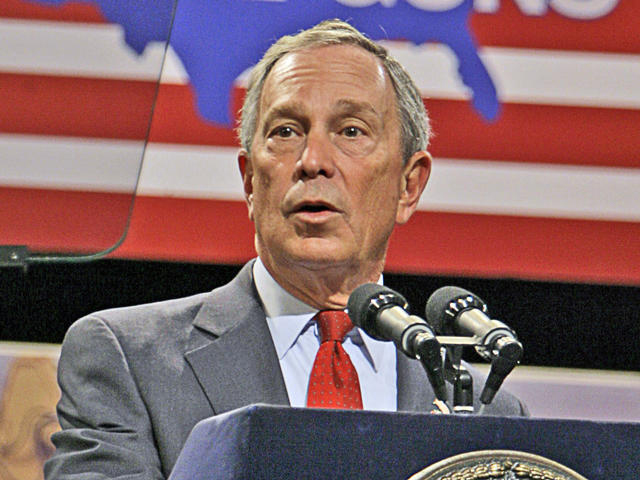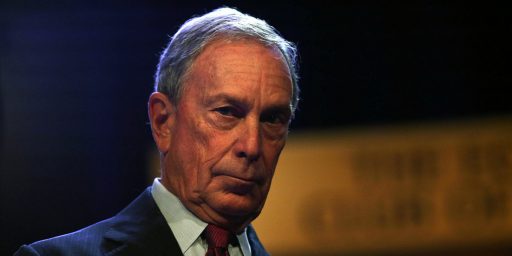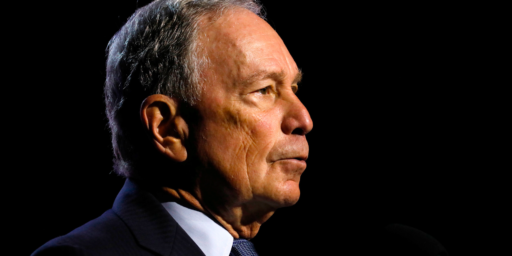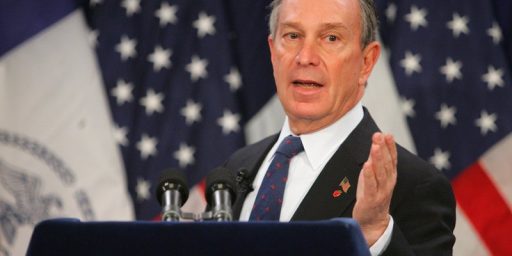Bloomberg Readying Independent Bid
 Talk of a Bloomberg candidacy won’t go away — mostly because Bloomberg won’t shut up about it (and he owns a media empire).
Talk of a Bloomberg candidacy won’t go away — mostly because Bloomberg won’t shut up about it (and he owns a media empire).
Buoyed by the still unsettled field, Mayor Michael R. Bloomberg is growing increasingly enchanted with the idea of an independent presidential bid, and his aides are aggressively laying the groundwork for him to run.
Former Senator David L. Boren of Oklahoma, who organized the session with former Senator Sam Nunn, a Democrat of Georgia, suggested in an interview that if the prospective major party nominees failed within two months to formally embrace bipartisanship and address the fundamental challenges facing the nation, “I would be among those who would urge Mr. Bloomberg to very seriously consider running for president as an independent.”
Next week’s meeting, reported on Sunday in The Washington Post, comes as the mayor’s advisers have been quietly canvassing potential campaign consultants about their availability in the coming months.
And Mr. Bloomberg himself has become more candid in conversations with friends and associates about his interest in running, according to participants in those talks. Despite public denials, the mayor has privately suggested scenarios in which he might be a viable candidate: for instance, if the opposing major party candidates are poles apart, like Mike Huckabee, a Republican, versus Barack Obama or John Edwards as the Democratic nominee.
A final decision by Mr. Bloomberg about whether to run is unlikely before February. Still, he and his closest advisers are positioning themselves so that if the mayor declares his candidacy, a turnkey campaign infrastructure will virtually be in place.
The scenario whereby Bloomberg finishes stronger than third in the national popular vote — or gets a single Electoral College vote — is hard to conceive. Undoubtedly, though, Bloomberg has the money and legitimacy to be a spoiler.
As for a “turnkey campaign infrastructure,” one would think that something like Unity08 or another pre-existing “party” would make more sense than a pure independent bid.
The rationale expressed here for his candidacy, though, is rather bizarre. Parties, by definition, can not and should not “embrace bipartisanship.” Indeed, the whole point of parties — and elections, for that matter — is to offer voters a choice between competing agendas. The time for bipartisan cooperation is after elections.
A Huckabee-Edwards contest is more than a bit implausible. It would, however, present the best opportunity for a well-financed centrist to make an appeal. Still, what’s his path to 270 Electoral Votes? Or, indeed, one? Is there a single state he would win, even with those polarizing choices?
Or, let’s say he wildly exceeds expectations and carries, say, New York and California. That would probably send the election to the House of Representatives. What’s his base of support there? There won’t be any members of the no-party party among the voters, after all.
Photo via Fox News.




I think we’ve reached a rather trying point in our political history. For a variety of reasons both major political parties have moved away from being catch-alls as they’ve been for many years and towards being programmatic parties. Whether coincidental to this, causing this, or a result of this, a large number of Americans self-identify with neither party rather than with either party.
I don’t think this means that the time is ripe for the birth of a third major party or that there are better prospects for independents. The simple truth is that those who don’t self-identify with one party or the other don’t all hold the same views or, probably. even compatible views.
Ultimately, the flywheel will come off but until it does I think the greatest likelihood is that the two major parties will become increasingly hostile to each other and more of us will feel disenfranchised.
I am seeing no blogosphere interest in Bloomberg whatsoever. The best way to make him go away is to ignore him.
P.S. I’m a NYer and can’t stand the guy. He’s switched parties so frequently that it’s obvious the only agenda he has is Bloomberg.
He’s an anti-gun nut in a year that the 2nd Amendment will be front an center due to Heller in the SCOTUS. He might fracture the Dems with that issue but get few independents. And in an election year, his involvement in dispatching private detectives to other states to attempt to make straw purchases in violation of federal gun control laws will get another look. The mere fact of a NY City mayor sticking his nose in other state’s business will not endear him to most of the electorate. He’ll learn the same lesson the Dems did in the mid-nineties, support of gun control on the national level gets you sent home to lick your wounds.
He can be a spoiler, but he can’t win. The question I have is which party would he pull more from? I can’t predict until we know the party candidates.
He stated explicitly he wasn’t running for President while being interviewed in Times Square, New Years Eve.